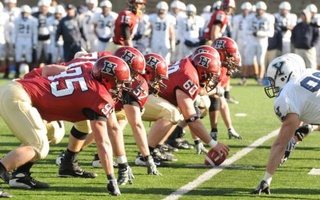Much has been done these last few weeks to address the critical issue of sexual assault on Harvard’s campus: formation of task forces, a call to action from student activists, and a promise from the administration to make combatting sexual assault—through both prevention and response—a top priority. All of these efforts are admirable and a sign that hopefully survivors and victims of sexual assault on our campus will have justice and better support in the future.
But with all the discussion and energy in the last month, I was surprised and disappointed that—yet again—turnout for Sexual Assault Awareness Month events was low. Organized every April by both students and administrators in the Office of Sexual Assault Prevention and Response (full disclosure—I am one of the students) SAAM features weekly events that grapple with difficult questions about sexual assault. This year included a community conversation about sexual assault at Harvard, a panel on the relationship between race and sexual assault in the media, a conversation with journalist Maureen Orth on the dynamics of power and sexual assault perpetration, a conversation on feminist porn with Tristan Taormino, and more.
So much effort goes into planning these diverse and thoughtful events. And yet every year, it feels like pulling teeth to get people to come. I thought this year would be different, but once again, it often felt like the efforts of OSAPR to organize these important conversations were ignored and dismissed.
There is so much going on constantly on this campus. It is physically impossible to attend every event or conversation that you think is meaningful and relevant. Here I am bemoaning the lack of participation in my organization’s events when I’ve missed countless others that are just as important. I observed Divest Harvard protests with interest and a desire to learn more, but I did not engage in them—I was more intent on rushing past to get to my Oggi’s sandwich (lunch is a cause I care deeply about). Furthermore, the topics discussed during SAAM are difficult and emotional, so many people opt out for personal reasons.
All the same, while I can’t ask for a packed room at every event, I was expecting more engagement from a campus that has been up in arms for the last month about Harvard’s failure to foster an environment with a healthy attitude towards sexual assault. With The Crimson’s publication of crucial op-eds, such as the very brave “Dear Harvard: You Win,” I suppose I was expecting news coverage to break with tradition and cover OSAPR’s efforts this year. But yet again, even with all the publicizing we did, I never read of a SAAM event on the front page.
It is so easy to write a vehement Facebook status about how “Harvard welcomes rapists” (a statement that I find ridiculous and inflammatory). It’s much harder, of course, to listen and learn about sexual assault both in the world and on our campus. The best way to prevent sexual assault, in my opinion, is through education. But the first step to learning is actually showing up for class.
Again, I understand it’s unrealistic to pay every cause here the amount of attention it deserves, and I admit that I’ve missed a few SAAM events as well. But along with criticizing and pushing our administration to do better, we must also engage when they are doing their best. OSAPR does excellent work in educating students about sexual assault and how to prevent it—I have witnessed firsthand the dedication and passion that the director and education specialists bring to their difficult tasks. But these efforts hardly ever get attention. It becomes disheartening to read only of what OSAPR is supposedly doing wrong and never any acknowledgement of all the fantastic things they are doing right.
If we as a university are going to dedicate ourselves to improving both prevention and response to sexual assault, we need to listen just as much as we speak up. For every Facebook status posted on this issue, we should have at least one conversation, attend one workshop, or reach out to one person involved in combating sexual violence. Here’s to next year being one of record-breaking attendance.
Isabel H. Evans ’14, a Crimson editorial writer, is an English concentrator in Adams House.
Read more in Opinion
On LuckRecommended Articles
-
 ALEX IN WONDERLAND: Young Fans Back Harvard Sports
ALEX IN WONDERLAND: Young Fans Back Harvard Sports -
Smart TalkTo claim that Harvard is devoid of intellectual discussion is to ignore the endless possibilities for debate and conversation that exist within its walls.
-
 J-Term Journal: Dinner with the Centerfold
J-Term Journal: Dinner with the Centerfold -
Enhancing Community ConversationsThe question for us now is: How we can make these conversations equally “relevant and thought provoking” for all students? And, how can we inspire these conversations to happen more often, either in an organic or structured way?













